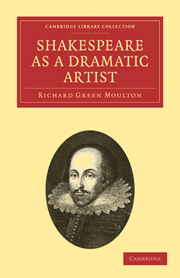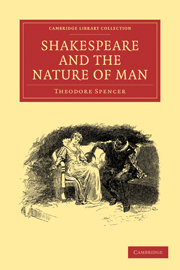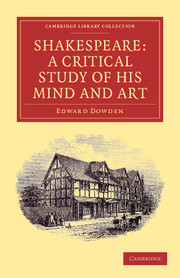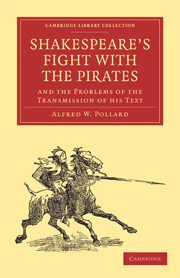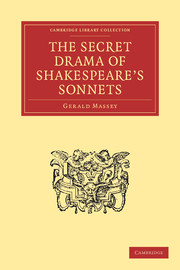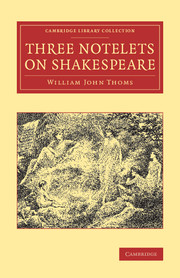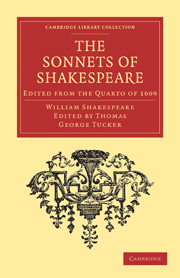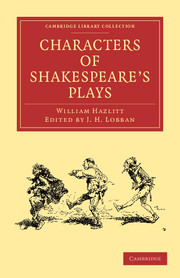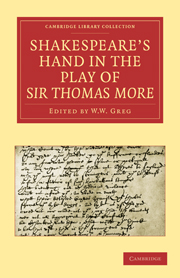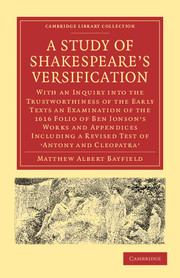Shakespeare as a Dramatic Artist
A Popular Illustration of the Principles of Scientific Criticism
£37.99
Part of Cambridge Library Collection - Literary Studies
- Author: Richard Green Moulton
- Date Published: May 2011
- availability: Available
- format: Paperback
- isbn: 9781108030823
£
37.99
Paperback
Looking for an inspection copy?
This title is not currently available on inspection
-
Written by British American critic Richard Moulton (1849–1924), this influential study of Shakespeare's dramatic technique introduces Moulton's 'prescience' of scientific criticism, an approach to literature that would later develop into modern literary theory. Moulton, who served as professor of English literature at Chicago, stated that his object was to 'claim for criticism a position amongst the inductive sciences, and to sketch in outline a plan for the dramatic side of such a critical science', arguing that Shakespeare's genius lay in his mastery of his dramatic art as much as in his deep knowledge of human nature. Published in 1893, this third edition expands significantly on the material in the first edition (1885) and the second (1888), as Moulton includes analysis of three additional Shakespearean plays, using work that had originally been presented to the New Shakespeare Society of London. Subsequent editions were produced in 1897 and 1906.
Customer reviews
Not yet reviewed
Be the first to review
Review was not posted due to profanity
×Product details
- Date Published: May 2011
- format: Paperback
- isbn: 9781108030823
- length: 464 pages
- dimensions: 216 x 140 x 26 mm
- weight: 0.59kg
- availability: Available
Table of Contents
Preface to the third edition
Preface to the second edition
Preface to the first edition
Introduction: plea for an inductive science of literary criticism
Part I. Shakespeare Considered as a Dramatic Artist, in Fifteen Studies:
1. The two stories Shakespeare borrows for his Merchant of Venice. A study in the raw material of the romantic drama
2. How Shakespeare manipulates the stories in dramatising them. A study in dramatic workmanship
3. How Shakespeare makes his plot more complex in order to make it more simple. A study in underplot
4. A picture of ideal villainy in Richard III. A study in character-interpretation
5. Richard III, how Shakespeare weaves Nemesis into history. A study in plot
6. How Nemesis and destiny are interwoven in Macbeth. A further study in plot
7. Macbeth, Lord and Lady. A study in character-contrast
8. Julius Caesar beside his murderers and his avenger. A study in character-grouping
9. How the play of Julius Caesar works up to a climax at the centre. A study in passion and movement
10. How climax meets climax in the centre of Lear. A study in more complex passion and movement
11. Othello as a picture of jealousy and intrigue. A study in character and plot
12. How The Tempest is a drama of enchantment. A study in dramatic colouring
13. How the enchantment of The Tempest presents personal providence. A study in central ideas
14. How Loves Labour's Lost presents simple humour in conflict with various affections and conventionalities. A further study in central ideas
15. How As You Like It presents varied forms of humour in conflict with a single conventionality. A study of more complex dramatic colouring
Part II. Survey of Dramatic Criticism as an Inductive Science:
16. Topics of dramatic criticism
17. Interest of character
18. Interest of passion
19. Interest of plot: statics
20. Interest of plot: dynamics
Appendix
Index.
Sorry, this resource is locked
Please register or sign in to request access. If you are having problems accessing these resources please email [email protected]
Register Sign in» Proceed
You are now leaving the Cambridge University Press website. Your eBook purchase and download will be completed by our partner www.ebooks.com. Please see the permission section of the www.ebooks.com catalogue page for details of the print & copy limits on our eBooks.
Continue ×Are you sure you want to delete your account?
This cannot be undone.
Thank you for your feedback which will help us improve our service.
If you requested a response, we will make sure to get back to you shortly.
×
